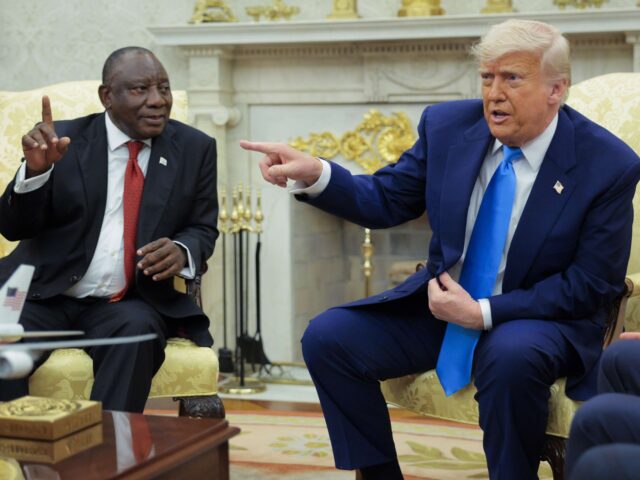Trump Makes South African President Watch Video Evidence of Threats to White Farmers

President Donald Trump’s meeting Wednesday with South African President Cyril Ramaphosa began cordially — but when Ramaphosa protested against claims of “genocide,” Trump turned on a video.
The video showed radical leader Julius Malema and other black political figures addressing rallies, chanting slogans such as “Kill the farmer!” and “Shoot to kill!” The video also showed threats to seize white-owned farmland, and a large memorial to murdered farmers featuring over a thousand crosses along a roadside.
Ramaphosa had begun by avoiding the issue, saying instead that he wanted to focus on trade, investment, and efforts to promote peace around the world. It was the South African journalists in the room who demanded that Trump answer for his claims about “genocide” and his refugee policy for white Afrikaners.
Ramaphosa said that Trump should hear directly from South Africans, and pointed to three white South Africans that he had brought along with him, including golfers Ernie Els and Retief Goosen, and Minister of Agriculture John Steenhuisen, the leader of the Democratic Alliance, an opposition party that now serves alongside Ramaphosa’s African National Congress (ANC) in a government of national unity (GNU).
Trump then countered by calling for the video to be played. Ramaphosa and the journalists had to sit through its duration, and Ramaphosa could not respond except by asking Trump for the location of the memorial.
Ramaphosa tried to argue that the leaders depicted in the video represented small opposition parties. Steenhuisen added that the DA had joined the ANC precisely to keep those parties out of the government.
Trump noted that those parties were large enough to fill large stadiums with their supporters, and asked why Julius Malema in particular, leader of the Economic Freedom Fighters (EFF), had not been arrested.
The discussion then took a thoughtful tone, as Trump called on Ernie Els to make a statement. Els said that it had been 35 years since Nelson Mandela had been freed, yet South Africa was struggling to fulfill its potential. “Two wrongs don’t make a right,” he said, referring to anti-white racism. He added that South Africa needed America’s help in making reforms: “We need the U.S. to push this thing through.”
Fellow golfer Retief Goosen validated Trump’s concerns about attacks on farmers and about crime in general. Businessman Johann Rupert pointed out that murder victims were both white and black, but added that South Africa had rejected American help in the past because of self-defeating anti-American ideology. A trade union representative backed up Rupert’s concern for economic growth, noting that the potential end of the Africa Grown and Opportunity Act (AGOA) at the end of September — or South Africa’s exclusion from it — could mean the loss of many jobs in South Africa, which is already struggling with high unemployment.
Trump was noncommittal when asked whether he would attend the G20 summit in South Africa in November; on whether he expected South Africa to drop its case against Israel at the International Court of Justice (ICJ), and on what compromises, in particular, he expected South Africa to make. But he had forced South African leaders to face, in an uncomfortably public way, the way their country is perceived abroad.
A journalist from NBC came in for criticism by Trump when he tried to interject questions about the jet donated by Qatar to the U.S. Air Force for use as Air Force One into the discussion about South Africa.
Joel B. Pollak is Senior Editor-at-Large at Breitbart News and the host of Breitbart News Sunday on Sirius XM Patriot on Sunday evenings from 7 p.m. to 10 p.m. ET (4 p.m. to 7 p.m. PT). He is the author of Trump 2.0: The Most Dramatic ‘First 100 Days’ in Presidential History, available for Amazon Kindle. He is also the author of The Trumpian Virtues: The Lessons and Legacy of Donald Trump’s Presidency, now available on Audible. He is a winner of the 2018 Robert Novak Journalism Alumni Fellowship. Follow him on Twitter at @joelpollak.